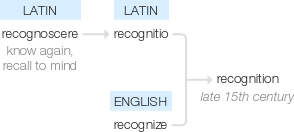Recognition
late 15th century (denoting the acknowledgement of a service): from Latin recognitio(n- ), from the verb recognoscere ‘know again, recall to mind’ (see recognize).
wiktionary
From Latin recognitionem (accusative of recognitio), from stem recognit, past participle of recognoscere.
etymonline
recognition (n.)
mid-15c., recognicion, "knowledge (of an event or incident); understanding," from Old French recognition (15c.) and directly from Latin recognitionem (nominative recognitio) "a reviewing, investigation, examination," noun of action from past-participle stem of recognoscere "to acknowledge, know again; examine" (see recognize).
Sense of "acknowledgment of a service or kindness done" is from 1560s. Sense of "formal avowal of knowledge and approval" (as between governments or sovereigns) is from 1590s; especially acknowledgement of the independence of a country by a state formerly exercising sovereignty (1824). The meaning "a knowing again, consciousness that a given object is identical with an object previously recognized" is by 1798 (Wordsworth). The literary (especially stage) recognition scene "scene in which a principal character suddenly learns or realizes the true identity of another character" is by 1837 (in a translation from German).
